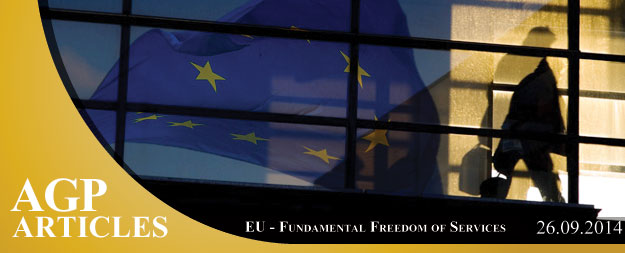
Recommended contact person
Right of establishment and freedom to provide Services
Over the years, the EU has been trying to make progress in the area of the Right of Establishment to provide Services…but has there been enough progress made in bringing about this freedom for various professions?
The Right of Establishment and Freedom to provide Services covers a very large variety of fields and professions. As laid down in Articles 49 and 56 of the TFEU, it is “the obligation of Member States to ensure unhampered right of establishment of EU nationals and legal persons in any Member State and the freedom to provide cross-border services”. Just as with the other fundamental freedoms of the EU, the idea is to remove barriers (legal and administrative) between member states.
Freedom of establishment includes the right to take up and pursue activities as self-employed persons and to set up and manage undertakings and companies under the conditions laid down by the law of the country of establishment for its own nationals. It also prohibits the Member State of origin from hindering the establishment in another Member State of one of its nationals or a company incorporated under its legislation.
According to the treaty wording and to case law, the right of establishment is not confined to individuals but also to companies and corporate bodies which are treated like individuals. The right of freedom of establishment has not been easily adopted by Member States. There has been a considerable need for harmonization of the national rules and regulations of member states and to remove their national restrictions. This created extensive legislation in this field. The result was that the Commission had to take further steps that bound the member states. Therefore the Commission recommended an action in specific areas including a more efficient policing and enforcement system, resulting in measures to suspend the enforcement of any national legislation which infringed EU law. At the same time the European Court of Justice had also been forwarding the removal of national restrictions in accordance with the principle of non-discrimination through case law.
Case law derived by the mid-seventies when the ECJ held that a Dutch national resident in Belgium with the appropriate qualifications to practice law could not be debarred from his professional activity on the ground that, according to Belgian law, a lawyer must be a Belgian national. Similarly in 1976 in the case of Thieffry v. Conseil de l’Ordre des Avocats à la Cour de Paris [1977] where a Belgian holder of a Belgian diploma of Doctor of Laws was refused entry to the Paris Bar the ECJ held that the restriction was incompatible EU articles and therefore concluded in favour of Thieffry. The same conclusion was given in the case of a British architect qualified to practice in France (case 11.77 Patrick v. Ministère des Affaires Culturelles) and in the case of a Dutch motor insurance claims investigator in Italy (case 90/76 Van Ameyde v. UCI).
A major obstacle to the harmonization of the freedom has been what can be defined to be in the public interest. Member states would restrict the above freedom in order to serve their country’s public interest. This matter was subject to considerable concern in the case of Commission v. Germanyon regarding the profession of the establishment of insurance services. As a matter of German law regulating the provision of insurance services in Germany and as a matter of public policy too, all insurers in Germany had to have a permanent establishment in Germany and all should be authorized by the German state. These measures were not only discriminatory against other nationals but also restricted the freedom of establishment and the freedom to provide services. At the hearing it was accepted that it was permissible for member states to provide for certain measures of supervision within their territory; a supervision that will investigate the business prior to carrying on activities and to monitor those activities continuously. Increasingly the market for the establishment of services has since been liberalized through the application of extensive legislations on this field.
In 1987 upon the Commission’s completion of the White Paper on the internal market, the results regarding the freedom of establishment were still not satisfactory. However through excessive case law it is now well established that one state may well demand compliance with its rules but still importers may suffer because they too are subjected to controls in their home state. The ability of a migrant to invoke EU law to challenge restrictive national rules was given important practical support in the case of Vlassopoulou. In this case a Greek national wished to work as a lawyer in Germany. It was held that national authorities are entitled to examine the knowledge and qualifications of the person concerned and, if the diplomas correspond only partially, the national authorities are entitled to require the person concerned to prove that he has acquired the knowledge and qualifications which are lacking. The Vlassopoulou approach has since been confirmed, followed, and applied.
A point of commercial significance in the field of freedom of establishment has been the 1999 case of Centros Ltd, which confines the scope of permissible public control in cases of company formation into a member state. The fact that a company was formed in a particular member state for the sole purpose of enjoying more favorable legislation and tax did not itself constitute an abuse, even if that company conducted its activities entirely or mainly on a second state. This case has been subject to much commentary and reactions.
Amateur activities seem unaffected by EU rules. Professions connected with building and engineering are subject to EU principles and directives relating to freedom of establishment and free movement of workers. Nationals of member states for example who wish to practice a profession in Cyprus, and possess qualifications which would entitle them to carry out that activity in some other member state, cannot be prevented from doing so by the competent Cyprus authority on the grounds of inadequate qualifications.
Regarding the question whether there has been considerable progress in bringing about the freedom of establishment for various professions the answer cannot easily be easily provided. What can easily be said though is that there has been a considerable progress over the years, the matter itself is an ongoing concern of the European Union and there is still pending legislation regarding the area in question. However, what needs to be said is that the concept of freedom of establishment has been adopted by most member states in most fields even though some of these fields remain to have been legally adopted.














